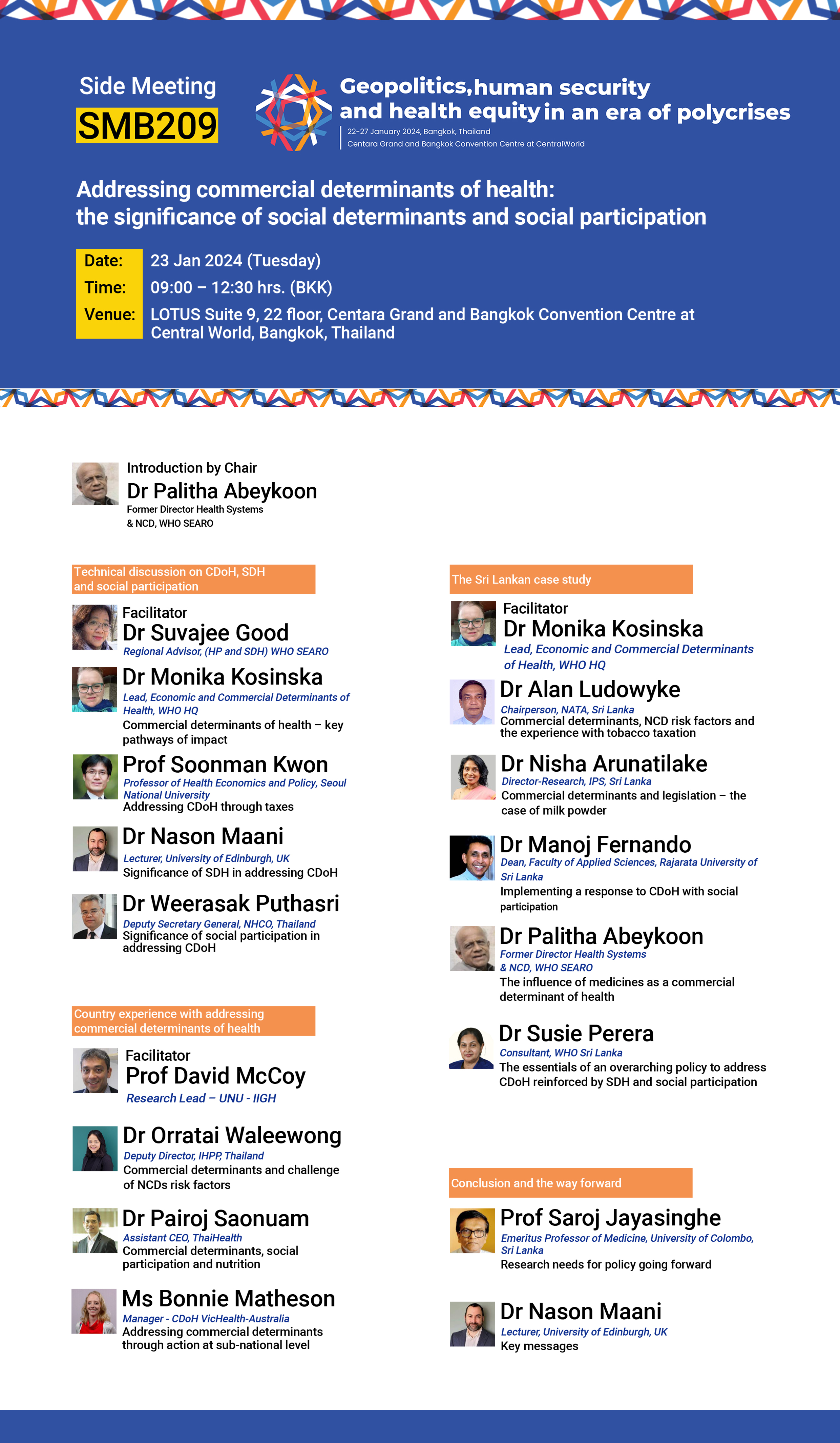Commercial Determinants of Health (CDoH) are the leading causes of global burden of disease and is a major threat to planetary health by being the driving force behind public health crises of the 21st century. Social determinants of Health (SDH) and social participation play a critical role in addressing and mitigating the impact of CDoH. WHO Country Office for Sri Lanka (WCO SRL) organized a side meeting at the Prince Mahidol Award Conference 2024 (PMAC) on 23 January 2024 in Bangkok, Thailand. Prince Mahidol Award Conference is an international forum attended by more than 1000 public health experts from across the world for sharing evidence for health-related policies and for strengthening social commitments for health development. The side meeting was organized with global and regional experts to present fresh perspectives, share experiences, to explore solutions and strengthen global dialogue on CDoH.
Commercial determinants of health are those conditions, actions and omissions that affect health. They arise in the context of the provision of goods or services for payment and include commercial activities, as well as the environment in which commerce takes place. Commercial determinants may directly or indirectly have positive or negative effects on people’s health. However, the majority of the effects have shown to influence risk behaviours that are harmful to health. Commercial determinants of health impact a wide range of risk factors, including smoking, air pollution, alcohol use, obesity and physical inactivity, and health outcomes, such as noncommunicable diseases, communicable diseases and epidemics, injuries on roads and from weapons, violence, and mental health conditions. Social determinants of health (SDH) are the non-medical factors that influence health outcomes. They are the conditions in which people are born, grow, work, live, and age, and the wider set of forces and systems shaping the conditions of daily life.
Both CDoH and SDH have an important influence on health inequities. These influences lead to avoidable inequities in health outcomes within and between countries. In countries at all levels of income, health and illness follow a social gradient: the lower the socioeconomic position, the worse the health. If the impacts of CDoH and SDH are not mitigated, the inequities will widen hindering the progress towards the achievement of Universal Health Coverage and Sustainable Development Goals.
The objectives of conducting the side meeting were to have a technical discourse on CDoH and SDH and its mitigatory mechanisms, and to showcase country best practices including that of Sri Lanka’s in addressing CDoH. Leading technical preparation, WCO SRL brought together global experts working in the area of CDoH, technical focal points from WHO, as well as country experts from Australia, Thailand and Sri Lanka.
Among the presenters were Dr Monika Kosinska, Lead, Economic and Commercial Determinants of Health, at WHO Headquarters. Dr Kosinka highlighted the magnitude of the commercial burden of the disease and the heterogeneity and complexity of commercial actors which makes addressing CDoH a challenge at all levels. Dr Nason Maani from University of Edinburgh, United Kingdom, a leading global expert on the subject area, underscored the significance of SDH in addressing CDoH. He further highlighted that the activities of the private sector can be immensely powerful, going beyond affecting health through the consumption of harmful products, to indirectly changing social norms and determinants, lobbying against certain policies, political donations and even to the extent of funding of science.
Experts from Thailand presented their experience on social participation which is involving people communities and civil society in decision-making processes. This has been practiced in Thailand to mitigate the effects of CDoH. Thailand also plans to propose a resolution on “Social Participation for UHC, Health and Well-being”, to be co-sponsored by Sri Lanka at the 77th World Health Assembly scheduled for May 2024.
Experience from two of the leading health promotion institutes were highlighted during the meeting; ThaiHealth of Thailand and VicHealth of Australia. Dr Pairoj Saonuam, Assistant CEO, Thai Health Promotion Foundation presented on healthy diet policies advocated by ThaiHealth in the recent years. Ensuring healthy partnerships with commercial actors, empowering young people to lead healthier communities and using a citizen science approach to monitor harmful industry digital marketing to young people were key activities highlighted by Ms Bonnie Matheson of VicHealth.
Sri Lanka presented its experience in control of tobacco and alcohol through legislation, taxation for sugar sweetened beverages, implementing a response to CDoH with community empowerment and efforts taken to mitigate the influence of medicines as a commercial determinant. Furthermore, “Stay Well Sri Lanka – A Wellness Plan” which is being proposed in Sri Lanka as an overarching policy to promote wellness and mitigate the influence of social and commercial factors was also highlighted.
Some of the key conclusions drawn from this side meeting were:
- Commercial determinants of health (CDoH) should be a critical consideration in social determinants of health, within and between countries. Comprehensive policy approach incorporating all stakeholders beyond the health sector is essential for mitigating their negative impact on health and wellbeing.
- Social participation and community empowerment, strengthening the bottom-up approach is critical in addressing CDoH.
- Continuous transdisciplinary implementation research is needed to generate evidence to instigate appropriate policies on CDoH both in health and non-health sectors.
- Best practices showcased by Sri Lanka, Thailand and Australia during the session can build more comprehensive and contextual actions and promote cross-country learning.
WHO Sri Lanka will continue to work with all stakeholders at global, regional and country level to further the CDoH mitigation agenda.

Further reading:
- Commercial determinants of health: https://www.who.int/health-topics/commercial-determinants-of-health#tab=tab_1
- Social determinants of health: https://www.who.int/health-topics/social-determinants-of-health#tab=tab_3
- Voice, agency, empowerment - handbook on social participation for universal health coverage: https://www.who.int/publications/i/item/9789240027794
- Institutionalizing social participation to accelerate progress towards universal health coverage and health security:
- https://cdn.who.int/media/docs/default-source/universal-health-coverage/who-uhl-technical-brief-socialparticipation.pdf?sfvrsn=307a71b0_3&download=true
